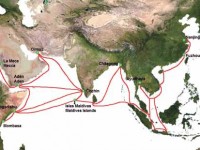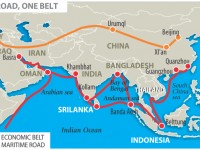David Shambaugh, Gaston Sigur Professor and Director of China Policy Program at George Washington University, Distinguished Visiting Fellow at Hoover Institution of Stanford University
Mar 27, 2015
President Xi Jinping will visit Washington D.C. in September, providing an essential opportunity for the two leaders to openly discuss bilateral relations, investment, and global issues. David Shambaugh calls on Chinese leaders to engage in action over slogans, and for each side to share their perceptions of the strategic intentions of the other; false perceptions must be discussed and refuted in order to reinvigorate mutual trust.

Michael Billington, Asia Specialist, Executive Intelligence Review
Mar 27, 2015
In October 2013, during a visit to Indonesia, Chinese President Xi Jinping announced the launching of the New 21st Century Maritime Silk Road, just one month after announcing the New Silk Road Economic Belt, while on a visit to Kazakhstan. These two initiatives, followed in 2014 by the plan to put together the BRICS New Development Bank and China’s establishment of the Asian Infrastructure Investment Bank that Fall, constitute a new paradigm for mankind.

Wu Jianmin, Former President, China Foreign Affairs University
Mar 26, 2015
The “One Belt and One Road” initiative concerns 65 countries and 4.4 billion people and is China’s most important and strategic initiative. As the Middle East and Europe faces social, political, and economic turbulence, China invites all major economies to join this endeavor to improve infrastructure and trade throughout the world. Increasingly, China’s development is inseparable from the world; and world’s stability and prosperity are inseparable from China.
Zhai Kun, Professor at School of International Studies; Deputy Director of Institute of Area Studies, Peking University
Mar 24, 2015
Economic and security structures in the Asia-Pacific region have shown a trend of changes towards the “dual-track structure” between U.S.-led allies and Chinese-led allies. It is imperative for China and the U.S. to optimize strengthen their complementary features, rather than maintain a bipolar and competitive nature, so as to ensure development and security in the Asia-Pacific region. Zhai Kun provides four suggestions to achieve this.
Chen Xiangyang, Director and Research Professor, CICIR
Mar 23, 2015
The Third Session of the 12th National People’s Congress delivered a “Report on the Work of the Government.” Notable advancement was made in conducting economic diplomacy with the Silk Road Economic Belt, 21st Century Maritime Silk Road initiatives, the Asian Infrastructure Investment Bank, and Silk Road Fund. More significant openness to the outside world and expanded economic diplomacy are priorities of diplomatic work in 2015.
Feng Zhaokui, Honorary Academician, Chinese Academy of Social Sciences
Mar 20, 2015
Abe must understand – and the U.S. should exert pressure on him – that the 70th anniversary of the end of World War II is prime time for him to profoundly reflect on Japan’s wartime crimes. If Abe goes too far in the wrong direction, there will be no peace in the Asia-Pacific and the hard-won beginning of a Sino-Japanese détente may vanish.
Morton Holbrook III, Executive Director, Hong Kong America Center
Mar 19, 2015
Since normalization of relations in 1979, US-China relations have been characterized by a mixture of cooperation and conflict. Up until a few years ago, it was clear that “cooperation” was the hallmark, the most important part, of the relationship.
Stephen Harner, Former US State Department Official
Mar 17, 2015
Britain has broken ranks with the United States to join China in the founding of the Asian Infrastructure Investment Bank (AIIB). As other nations like Australia and South Korea choose to similarly defy U.S. opposition to the AIIB, and join, it could shake Japan’s confidence in its own position and even in the reliability of its alliance with the U.S.
Chen Xiangyang, Director and Research Professor, CICIR
Mar 13, 2015
The current international situation is rife with change, uncertainty and crisis in the Middle East, Asian Pacific, and Europe, largely due to shifting world power. Chen Xiangyang overviews changes and contradictions around the globe from a realist perspective on power relations.
Wu Sike, Member on Foreign Affairs Committee, CPPCC
Mar 12, 2015
China’s Foreign Minister Wang Yi recently presided over a discussion on international security at the UN in New York. The principle of unity and multilateral cooperation, the basis of the original UN Charter, was the foreground to China’s continued calls for cooperation on investments, terrorism, and military trust mechanisms.
Back to Top

- China-US Focus builds trust and understanding between the U.S. and China through open dialogue among thought leaders.
- Our Offerings
- Topics
- Videos
- Podcasts
- Columnists
- Research Reports
- Focus Digest
- Stay Connected
-
Thanks for signing up!
- Get the latest stories from China-US Focus weekly.